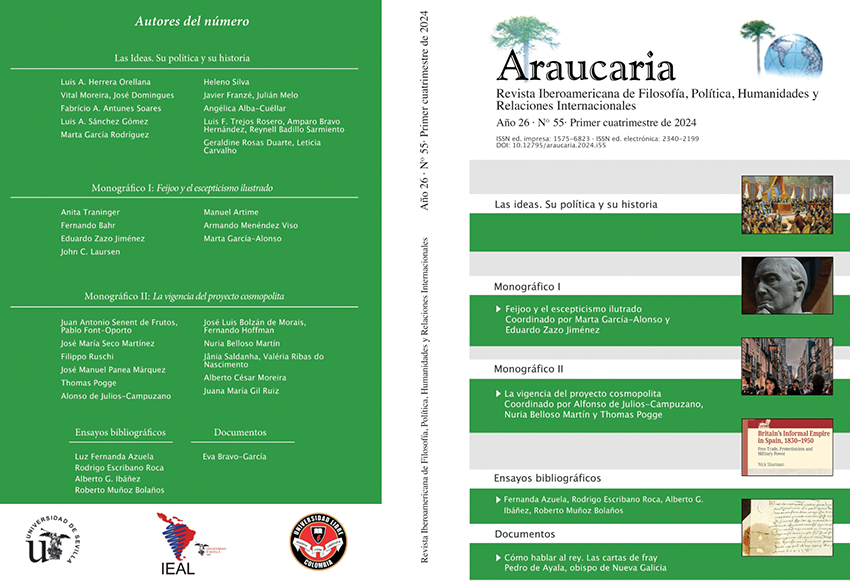This Side of the Frontier: Hegemony, Populism and Pluralism
This Side of the Frontier: Hegemony, Populism and Pluralism
DOI:
https://doi.org/10.12795/araucaria.2024.i55.07Palabras clave:
Palabras clave: Pluralismo, Populismo, Hegemonía, Frontera Política, LaclauResumen
Abstract: This paper poses the following questions: What is pluralistic hegemony? What are its defining features? Can populism be seen to possess them? We draw on Laclau’s thought to examine whether antagonism and “the name of the leader” as an empty signifier are incompatible with pluralism. With reference to various different perspectives regarding the relationship between pluralism, hegemony and populism, we present our own particular understanding. Our conceptualization distances itself from the notion that pluralism involves an endless proliferation of difference and the agonistic view that seeks to sublimate antagonism, and also from Laclau’s “the name of the leader” as an archetypal signifier of populism. Rather than the political frontier being the antithesis of pluralism, we see it as its precondition, with the empty signifier not representing a problem in itself, except when its name is pre-given. We perceive pluralism as being open to contingency, as a logic of the production and flow of differences.
Descargas
Citas
Aboy Carlés, G. (2005). “Populismo y democracia en la Argentina contemporánea. Entre el hegemonismo y la refundación”, en Estudios Sociales 28(1), 125-149.
Aboy Carlés, G. (2010). “Populismo, regeneracionismo y democracia”, en POSTData 15(1), 395-427.
Aboy Carlés, G. y Melo, J. (2014). “La democracia radical y su tesoro perdido. Un itinerario intelectual de Ernesto Laclau”, en POSTData 19(2), 395-427.
Arditi, B. (2010). “Post-hegemonía: la política fuera del paradigma postmarxista habitual. En H. Cairo y J. Franzé. (Eds.). Política y cultura. pp. 159-193. Madrid: Biblioteca Nueva.
Barros, S. (2018). “Polarización y pluralismo en la teoría de la hegemonía de Ernesto Laclau”, en Latinoamérica. Revista de estudios latinoamericanos 67, 15-38.
Castoriadis, C. (1997): “Democracy as Procedure and Democracy as Regime”, in Constellations, vol. 4, nº 1, pp. 1-18.
De Ípola, E. (2009). “La última utopía. Reflexiones sobre la teoría del populismo de Ernesto Laclau”. Claudia Hilb (comp.). El político y el científico. Ensayos en homenaje a Juan Carlos Portantiero. Buenos Aires: Siglo XXI.
Di Tella, T. (1965). “Populismo y reforma en América Latina”, en Desarrollo Económico 4(16), 391-425.
Foucault, M. (2003a [1997]). “7 January 1976”, in Society must be defended, New York, Picador, pp. 1-21.
Foucault, M. (2003b [1997]). “14 January 1976”, in Society must be defended, New York, Picador, pp. 23-41.
Franzé, J. (2021). “Un hogar para la (muerte de la) política: el institucionalismo en Laclau”. Andamios, 18 (46), Mayo-Agosto, 19-45.
Germani, G. (1962 [1956]). “La integración de las masas a la vida política y el totalitarismo”, en Política y sociedad en una época de transición, Paidós, Buenos Aires, pp. 326-353.
Ionescu, G. and Gellner, E. (Eds.) (1969). Populism: Its Meanings and National Characteristics, London, Weidenfeld and Nicolson (The Nature of Human Society).
Laclau, E. (1977). “Towards a Theory of Populism”, in Politics and Ideology in Marxist Theory: Capitalism, Fascism, Populism. London: New Left Books, pp. 143–198.
Laclau, E. (1990). “New Reflections on the Revolution of Our Time”, in New Reflections on the Revolution of Our Time. London: Verso, pp. 3-85.
Laclau, E. (1996). “Why do empty signifiers matter to politics? in Emancipation(s). London: Verso, pp. 36-46.
Laclau, E. (2005a). On Populist Reason. London; New York: Verso.
Laclau, E. (2005b). “Populism What's in a Name,” in F. Panizza, Populism and the Mirror of. Democracy. London; New York: Verso, pp. 32–49.
Laclau, E. and Mouffe, C. (1985). Hegemony and Socialist Strategy. London: Verso.
Melo, J. A. y Aboy Carlés, G. (2014). “La democracia radical y su tesoro perdido. Un itinerario intelectual de Ernesto Laclau”, en POSTData 19(2), 395-427.
Murmis, M. y Portantiero, J. C. (1987 [1971]). “El movimiento obrero en los orígenes del peronismo”, en Estudios sobre los orígenes del peronismo, Buenos Aires, Siglo Veintiuno Editores, pp. 59-129.
Portantiero, J. C. y De Ípola, E. (1981). “Lo nacional popular y los populismos realmente existentes”, en Nueva Sociedad 54, mayo-junio, 7-18.
Schmitt, C. (2007 [1932]). The concept of the polítical, Chicago and London: The University of Chicago Press.
Wittgenstein, L. (2009 [1953]). Philosophical investigations. Translated by G.E.M. Anscombe, P.M.S. Hacker and Joachim Schulte. Wiley-Blackwell.
Weber, M. (2019). Economy and society. A new translation. Edited and translated by Keith Tribe. Cambridge, Massachusetts; London, England: Harvard University Press.
Descargas
Publicado
Cómo citar
Número
Sección
Licencia
Las ediciones impresa y electrónica de esta Revista son editadas por el Secretariado de Publicaciones de la Universidad de Sevilla, siendo necesario citar la procedencia en cualquier reproducción parcial o total.Salvo indicación contraria, todos los contenidos de la edición electrónica se distribuyen bajo una licencia de uso y distribución “Creative Commons Atribución-NoComercial-SinDerivar 4.0 Internacional”








